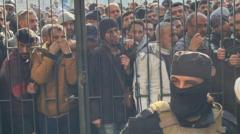In a significant turn of events, the "reconciliation center" in Damascus has become a key locale where former soldiers of covertly ousted President Bashar al-Assad's regime are voluntarily disarming. The center, operated by the rebel group Hayat Tahrir al-Sham (HTS), aims to facilitate the transition of these soldiers back into civilian life. On December 6, as HTS forces advanced through Homs, soldier Mohammed el-Nadaf made the pivotal choice to abandon his post and discard his military uniform, driven by the realization that survival was paramount over loyalty to a disintegrating regime.
El-Nadaf, alongside fellow soldier Mohammed Ramadan, cited lack of orders and inadequate remuneration as factors fueling their departure from the military ranks. With monthly salaries hovering under $35 (£28), many soldiers were compelled to find alternative employment just to meet basic living expenses in a nation crippled by protracted conflict. Ramadan, still in possession of his assigned Kalashnikov, expressed his desperation to escape the grind of military life.
The reconciliation centers have opened their doors to former military personnel, police, intelligence officers, and anyone affiliated with pro-Assad militias, offering them a temporary civilian identity and the opportunity to turn in their weapons. HTS has proclaimed a sweeping general amnesty for past regime supporters, aiming to reintegrate them into society and foster a sense of safety.
Desperation is palpable within the crowded confines of the Damascus center, formerly a Baath Party office. Many men congregated there were eager to dissociate themselves from the Assad regime and its notorious actions. El-Nadaf voiced his aversion to participation in the regime's "despicable acts," recounting previous attempts to flee military service thwarted by bureaucratic constraints. He, along with others, now seeks to reclaim civilian status and secure employment.
While the environment within the centers seems cordial, the escalating risk of retaliation against former regime supporters looms large. Reports have emerged highlighting rising instances of violence, including kidnappings and murders, in a landscape already marred by bloodshed. Recently, three judges from Masyaf, perceived as loyalists, were brutally killed, spurring fears among their families and communities.
Family members of the slain judges implored HTS for protection, asserting that the new governing authority bears responsibility for ensuring security. With HTS denouncing the killings and pledging accountability for torture and violence, the fragile balance between justice and safety hangs in the balance.
As Syria grapples with its future post-Assad regime, the emergence of reconciliation centers offers a glimmer of hope juxtaposed against a backdrop of turmoil. The attempts at amnesty and retribution intricate to political reconciliation carry deep implications for the nation’s path forward, which remains uncertain yet crucial in shaping what comes next for Syria and its people.
El-Nadaf, alongside fellow soldier Mohammed Ramadan, cited lack of orders and inadequate remuneration as factors fueling their departure from the military ranks. With monthly salaries hovering under $35 (£28), many soldiers were compelled to find alternative employment just to meet basic living expenses in a nation crippled by protracted conflict. Ramadan, still in possession of his assigned Kalashnikov, expressed his desperation to escape the grind of military life.
The reconciliation centers have opened their doors to former military personnel, police, intelligence officers, and anyone affiliated with pro-Assad militias, offering them a temporary civilian identity and the opportunity to turn in their weapons. HTS has proclaimed a sweeping general amnesty for past regime supporters, aiming to reintegrate them into society and foster a sense of safety.
Desperation is palpable within the crowded confines of the Damascus center, formerly a Baath Party office. Many men congregated there were eager to dissociate themselves from the Assad regime and its notorious actions. El-Nadaf voiced his aversion to participation in the regime's "despicable acts," recounting previous attempts to flee military service thwarted by bureaucratic constraints. He, along with others, now seeks to reclaim civilian status and secure employment.
While the environment within the centers seems cordial, the escalating risk of retaliation against former regime supporters looms large. Reports have emerged highlighting rising instances of violence, including kidnappings and murders, in a landscape already marred by bloodshed. Recently, three judges from Masyaf, perceived as loyalists, were brutally killed, spurring fears among their families and communities.
Family members of the slain judges implored HTS for protection, asserting that the new governing authority bears responsibility for ensuring security. With HTS denouncing the killings and pledging accountability for torture and violence, the fragile balance between justice and safety hangs in the balance.
As Syria grapples with its future post-Assad regime, the emergence of reconciliation centers offers a glimmer of hope juxtaposed against a backdrop of turmoil. The attempts at amnesty and retribution intricate to political reconciliation carry deep implications for the nation’s path forward, which remains uncertain yet crucial in shaping what comes next for Syria and its people.





















